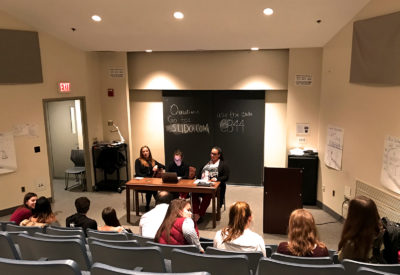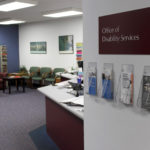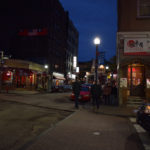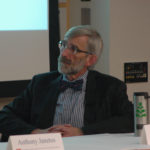
The Boston University School of Education hosted a town hall meeting Thursday evening to give a voice to SED students who have questions or concerns regarding the recently-announced merger between Wheelock College and BU.
The Wheelock School of Education, Child Life and Family Studies will be absorbed by SED on June 1 to form the Wheelock College of Education and Human Development. The town hall meeting was open to current undergraduate and graduate SED students, as they are the ones who will be most directly affected by the merger, according to BU spokesperson Colin Riley.
“When you’re talking about change and people who would recognize that their school is the one that’s affected the most,” Riley said, “we want to be able to be transparent and open and address all the questions that they have.”
Media representatives were not allowed into the meeting on account of the sensitivity surrounding students’ concerns.
Riley, who attended the town hall, said after the fact that the meeting was the first step in the process of preparing for the merger and keeping SED students informed about how it will affect their education.
“I’m sure with many people, any questions or concerns were relieved,” Riley said. “This is just the first of many discussions. There will be others as they learn more about the merger.”
One of SED’s priorities at the moment is to hear the voices of BU students in order to accommodate them properly when the merger takes place, according to Caysie Carter, the director of undergraduate student services at SED.
“It’s important to us,” Carter wrote in an email before the town hall, “that we engage students in these conversations so that we can share the information we have at this time and collect their feedback to pass along to decision-makers as this project moves forward.”
The forum, which around 60 students attended, was led by Carter, as well as Katharine Nelson, the director of graduate student services at SED. Carter and Nelson introduced a faculty panel, giving a brief overview of the status of the merger, according to Riley, and why they had chosen to open a discussion about it to the students themselves.
The main concerns of SED students included whether or not the merger will make it harder to register for classes or to matriculate, Riley said, and the forum confirmed that their education at BU will not be interrupted by the merger.
Another common concern among SED students at the town hall was whether or not the Wheelock merger will affect the quality or availability of academic advising in SED, according to Riley.
“Our education students highly regard the faculty advisors, and they want to make sure that that level of expertise continues, and they’re assured that it will,” Riley said. “Most questions related to programs and the fundamentals are still sort of being worked on.”
Several students who attended the forum declined to comment on the contents of the meeting and their personal concerns.
Some SED students who did not attend the town hall said they are generally pleased with the way the administration is keeping them in the know about the upcoming transition, though there is definitely room for improvement.
Emma Meier, a freshman who did not go to the meeting, said she is pleased with the way the university has been proactive in informing SED students about the merger and how it will affect them.
“I feel like I’m well-informed by the university on what is happening, which makes me feel comforted,” Meier said. “So far, it seems like this merger will be good, as Wheelock has a fantastic early education program and great graduate programs as well, from what I’ve heard.”
But Sebastian Betsch, a sophomore, said he thinks many SED students, including himself, did not go to the meeting because it overlapped with his SED class and also because students are generally uninformed on the effects and status of the merger.
“[Students] feel nervous to ask questions when they don’t know enough themselves,” Betsch said. “[SED students] have a lot of weird classes that go [late into the night] and this event was from like 5 to 7 [p.m.] and there are classes that literally run over the same time.”
Alex Reilly, a sophomore, said she would have liked to go to the meeting, but could not because of a class that was scheduled at the same time — an issue that she says affected at least the 35 other people in her class.
Reilly added that she thinks although SED is making some effort to appease students’ concerns, the communication between the administration and the affected students needs to be improved.
“The only information we’ve gotten so far from SED has been an email that basically said, ‘We don’t really have answers for you yet,’” Reilly said. “There’s not been quite enough [support], but … I know that there’s a really great culture of supporting students … The administration at SED really does know that they need to step up their game, and I think in the future there will be more.”














